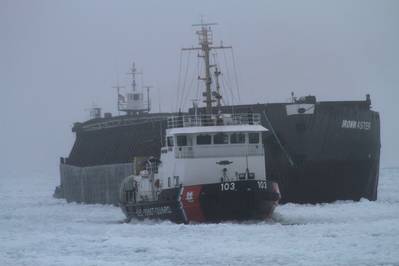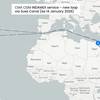New Bill Aims to Boost Great Lakes Icebreaking
Lawmakers in the U.S. are reintroducing legislation aiming codify the U.S. Coast Guard’s icebreaking mission on the Great Lakes and increase the icebreaking capacity of the Great Lakes fleet.
“Inadequate icebreaking capacity in the Great Lakes is costing us thousands of American jobs and millions in business revenue. We must boost our icebreaking capacity in the Great Lakes to keep our maritime commerce moving,” said Senator Tammy Baldwin (D-WI), who introduced the bipartisan Great Lakes Winter Commerce Act alongside Senator Todd Young (R-IN) and Gary Peters (D-MI).
“[The legislation] will move our region closer to getting the sufficient icebreaking resources needed to support our maritime industry, mitigate devastating climate-related events and protect our Great Lakes for generations to come. I will keep working with my colleagues to get this job done for Wisconsin businesses and workers,” Senator Baldwin said.
Icebreaking is critical for commerce in the Great Lakes, and increasing icebreaking capacity will help the many businesses and workers that rely on the maritime industry to transport their goods to market and grow our regional economy.
“Hoosier businesses and workers rely on the Great Lakes to transport goods and services, but commerce can be impeded without icebreaking to clear the pathway during cold weather months,” said Senator Young. “Roughly 28% of our nation’s annual economic output comes from the Great Lakes region, and the pandemic has only emphasized the area’s importance to our nation’s economy. Our legislation will support icebreaking missions to expand capacity to ship goods, create jobs, and strengthen the economy in Indiana and other Great Lake states.”
“Icebreaking in the Great Lakes is critical not just for Michigan’s economy – but for our entire country. As we have seen this winter, the economic crisis caused by the Coronavirus pandemic has made the importance of icebreaking more vital than ever to our small business community,” said Senator Peters.
Icebreaking capacity in the Great Lakes supports more than 90 million tons of cargo annually. A study commissioned by trade group the Lake Carriers’ Association found that during the 2018-2019 ice-season, businesses that depend upon the Great Lakes maritime industry lost over $1 billion in revenues because of delays caused by inadequate icebreaking. These economic losses resulted in the loss of over 5,000 jobs throughout the Great Lakes Region.
The Senators’ bipartisan bill would update the outdated U.S. Coast Guard’s (USCG) Great Lakes icebreaking mission and increase the icebreaking capacity of the Great Lakes fleet. Specifically, the legislation:
- Codifies into law the USCG’s icebreaking mission in the Great Lakes. Requires the USCG to break ice in the Great Lakes in accordance with the reasonable demands of commerce set forth in the bill. The standards derive from a 1997 Coast Guard study outlining icebreaking requirements on the Great Lakes. They are written to allow the USCG to size its icebreaker fleet to be capable of handling the vast majority of ice seasons while limiting excess capacity. The bill includes a one-time report on the operating costs associated with this new performance standard.
- Requires USCG to report to Congress on the icebreaking season. Requires an annual report of USCG activities during the previous winter’s icebreaking activities.
- Requires USCG to coordinate with industry for icebreaking operations.
- Defines “reasonable demands of commerce.” “The safe movement of commercial vessels transiting ice-covered waterways in the Great Lakes, regardless of type of cargo, at a speed consistent with the design capability of Coast Guard icebreakers operating in the Great Lakes.”
- Authorizes $350 million for the construction of a new Great Lakes Icebreaker and authorizes the USCG to expedite its procurement.
Jim Weakley, President of the Lake Carriers’ Association, said, “This historic bill will codify into law a long time Coast Guard mission that protects national and economic security. It provides Congressional direction and performance metrics. Currently, the Coast Guard interprets the 'reasonable demands of commerce' as meaning that an ice covered waterway is open until a second vessel is stuck in the ice for more than twenty-four hours as a result of another vessel’s inability to move. They only report to Congress ice restrictions in four connecting channels for the entire Great Lakes.”
John Clemons, President of the Great Lakes Maritime Task force and American Maritime Officers Union National Vice President, Great Lakes, said, “For too many years, inadequate icebreaking has unnecessarily risked the lives of sailors. Ships have been forced into collisions and groundings or have been sliced open by ice because no Coast Guard icebreakers were available to assist. The bill respects those risking their lives to keep our economy moving during the winter.”
Richard Hammer, Vice President of the Great Lakes Maritime Task Force and General Manager of Donjon Shipbuilding, said, “This has been a priority for the Great Lake Maritime Task Force for a decade and we welcome the bill’s introduction. Just like we plow our roads, we need to keep traffic moving on our maritime highways.”
Steve Fisher, Executive Director of the American Great Lakes Ports Association, said, “This bill supports jobs across the Great Lakes and the nation. It comes at a critical time as ports continue to move cargo vital to the economic recovery. Now, more than ever, predictable and dependable icebreaking is needed to ensure cargo can continue to move efficiently. It would be devastating to have another winter like 2019 when the economy lost $1 Billion and more than 5,000 jobs due to inadequate icebreaking.”












